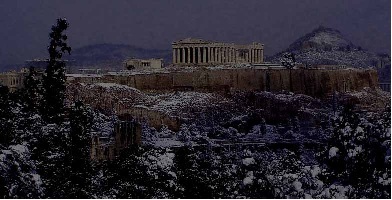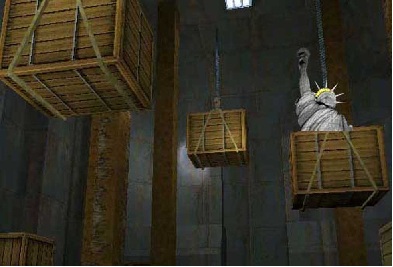 |
|
|
Athens, Christmas Eve 2012: A Futuristic News Bulletin from the BBC by Andrew Leech, ELT News, Limejuice |
|
| Here is the 6 o’clock news from the BBC at Bush House, London, on 24th December 2012. Tonight, we visit the capital of Greece, one of the poorer and hardest hit members of the former EU that disintegrated in May, this year. You may recall that the EU split in July, with the richer parts - like Germany, Austria, France and Luxembourg - moving off and keeping the Euro (€), while the others - those owned by the Banking Federation (BF) - making do with the second tier currency, the MiniYuro (m€) trading at 2 to 1 to the standard euro, that the BF established a year ago. |
|
Tonight, while Athens prepares for its second Christmas of austerity and virtual enslavement to the BF, Syntagma Square is conspicuous by the absence of its large decorated tree. Neither can the country afford the electricity, nor can government employees be found to cut one and bring it to the centre. Any wood available is immediately seized for fuel, since heating oil is so expensive and mainly the prerogative of politicians and the more well off. The chief of police, Dimos Elpidos, told us he was happier than expected. Muggings had fallen to only 23 yesterday and burglaries had also dropped. It seems that thieves have realised that nobody has anything worth stealing left. |
 |
|
|
|
| To expand the economy, the BF have arranged for certain well known multinationals such as Donna Karen, Kalvin Klein and GAP to move textile manufacturing sections from India and China to Greece. Here, in Greece, they are able to capitalise on the low salaries of about one Euro per hour (2 m€). They are particularly fond of the nimble fingers of Greek children (the working age has been reduced to ten years) who can manage very fine stitching on hand made garments that are sold at fine prices abroad and, according to the BF, “help reduce the national debt.” And now let us turn to the USA, currently under the transition government appointed by Goldman Sachs, which is approaching its first year in recession and trying to cope with the same conditions that are already well known to the phlegmatic Greeks. This dark area in the first picture is an unlit section of Times Square and the crates in the second contain the Statue of Liberty which has been purchased by a banking institution. |
 |
|
(Posting date 08 January 2012. Reprinted with permission ELT News, Limejuice.) Andrew Leech (aleech@ath.forthnet.gr) is a former contributing editor of the Greek-American Review of New York. He was born in Cairo, Egypt, of a British father (Lt Colonel British Army) and Greek mother (Marika Calogeropoulou: ballerina, teacher & choreographer). Educated in Britain, he moved to Greece in 1971 while conducting research into the language learning strategies of young children. He returned to Britain in 1977 for postgraduate study. In 1981, he worked in Greece for the Cararigas Schools as Director of Studies before starting his own school in 1984. He also became Director of Studies and Deputy Headmaster of the prestigious St Lawrence College for an interim period. Developing a keen interest in journalism in 1990, Leech became first an internationally known educational correspondent for ELT News and, later, a diplomatic correspondent for Athens News, focusing on visiting dignitaries and heads of state. He is a longstanding member of the Society of Authors and is also a lecturer in Journalism and Communications at Deree College, Athens. For more information about Andrew Leech or to read more of his fine articles, see his brief biography at http://www.helleniccomserve.com/andrewleechbio.html or visit the archival section of HCS devoted to his works at http://www.helleniccomserve.com/archiveleech.html HCS encourages readers to view other articles and releases in our permanent, extensive archives at the URL http://www.helleniccomserve.com/contents.html. |
|
|
|
|
2000 © Hellenic Communication Service, L.L.C. All Rights Reserved.
http://www.HellenicComServe.com |
|
